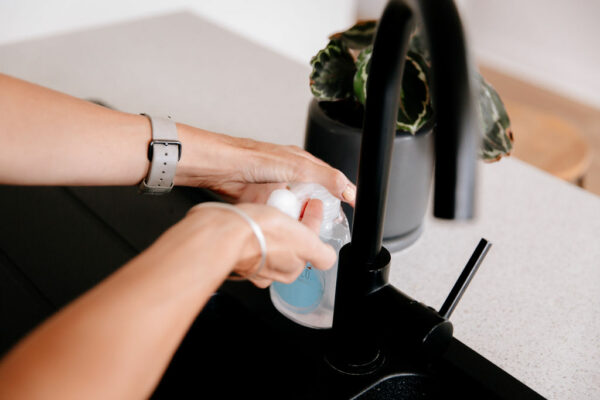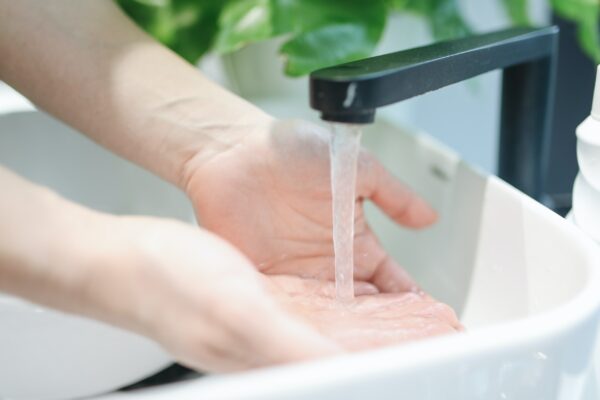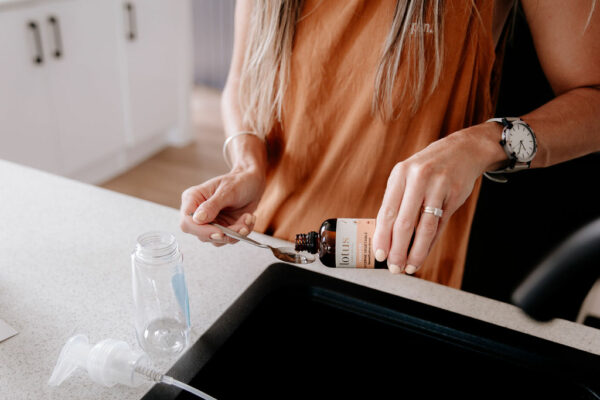Sick of dry and cracked hands? Skin friendly hand washing tips to help
Skin friendly hand washing tips to give your skin a helping hand
During one of my pregnancies hand washing was making me miserable. I had developed a range of hypersensitive issues including eczema and contact dermatitis and my standard wash was making my skin dry and sore. Converting to natural cleaners was an easy choice for me – reducing the chemical burden on my family (and my hands) has been nothing but beneficial. Avoiding the harsh ingredients I was reacting made a big difference as it gave my skin a chance to settle down and heal. All it took was a few easy swap outs, especially the products I was using the most – knowing what ingredients were causing my skin to react and what to avoid was the starting point. So, if you suffer from similar conditions read on, we have solution.
Better, skin friendly hand washing.
One easy place you can aid in reducing eczema and contact dermatitis is in your hand wash routine. Here’s a few tips for what will help.
- Wash with warm water, not hot. Hot water will further breakdown the integrity of your skin and dry it out more. You want to maintain the natural oils on your skin.
- Use a natural hand soap as soap is gentle on skin. It is the slipperiness of soap that washes your hands, the dirt and germs literally slide off.
- For hands that need a bit more TLC, especially while they are healing, look a hand wash with added glycerine, the boost in moisture will help your delicate skin. Glycerine is a humectant, this means it will draw moisture back onto your skin. Soap also naturally has glycerine in it as part of the soap making process.
- Rinse well then pat your skin dry with a soft towel – avoid vigorous rubbing, the fiction will only pull at your already sore skin.
- After drying, if your skin is feeling particularly dry, use a moisturiser with a clean ingredient list (avoid irritating perfumes, dyes, petrochemicals and preservatives). Or moisturise at bed time as needed.
What to avoid
- Irritating ingredients – read the ingredient list, this way you can see what is in the wash to know if you skin is going to react.
- Stay away from harsh stripping detergents. Your skin has a natural oil that is washed away by these detergents. As an easy rule avoid surfactants ending in sulphate (there are others to avoid but this is a good start) – such as Sodium Lauryl Sulphate (SLS) and Sodium Laureth Sulphate (SLES) and sodium coco sulphate. Don’t be fooled by marketing saying these are plant based – these are cheap aggressive, damaging detergents.
- Synthetic perfumes, preservatives, and dyes. These are especially irritating to dry cracked skin. What’s more these ingredients will stay on your hands, soaking in and transferring to the next thing you do – like preparing food or touching your face.
- Anything anti-bacterial and alcohol based – ouch! Alcohol is especially drying, and anti-bacterial chemicals are irritating, add to antibiotic resistance and don’t keep your hands any ‘cleaner’ than washing with soap and water. In fact, in some countries, anti-bacterial washes like triclosan have been banned as they do more harm than good the cleanliness claims have found to be just marketing hyperbole.
For making improvements to the health of your skin, in terms of a hand washing routine when you have dry skin or allergies like eczema, I recommend getting back to basics – and only use products that are pared back and natural (i.e. you should be able to recognise EVERY ingredient within it). What a hand soap needs to do is “’collect’ the germs from your skin as you lather, so they can then be washed away by water. What you don’t want is a product that will obliterate everything it touches, including your skin. As a side note, your skin is the largest organ system of your body and is highly absorbent; its not just your hands receiving a hefty dose of the ingredients, it’s being delivered throughout your body.
Stick to ingredients you already trust
So having said that, I also have an easy solution. What I use in my home is a foaming soap that only has four natural ingredients:
1) Figgy home cleaning castile soap – this is what removes the germs, and it’s traditionally made from 100% coconut oil on the Kāpiti Coast. Find out more about our soap here
2) Glycerine – a plant derived gel like substance that draws moisture into the skin;
3) Essential oil – distilled and pressed from plants, essential oils capture the beauty of a scent like a synthetic fragrance never can. They also have skin calming and healing properties too.
4) Water……. And that’s it!
In addition, I have a reusable workhorse of a foaming soap pump that has been going for over a year which saves waste – an added bonus. AND best of all, my kids love the foaming soap too! I think we all know how germy kids can be (grimace).
You can use this foaming soap day in and day out and there is not a harsh chemical or stripping detergent in sight. You can also tailor it to suit your skin type and preferences – a little more glycerine for particularly dry skin, and little more castile soap for a thicker foam etc.

If you want to give this a go there is a foaming soap pack available in the Figgy & Co. webstore that has everything you need. No thinking necessary (except for getting to choose your own essential oil – yay!). The pack also includes a recipe card to make it an easy and seamless switch -because let’s face it, its got to be easy and well as effective.
This hand wash routine has significantly reduced the contact dermatitis and eczema on my hands. Personally I hardly get any flare ups anymore. But let’s keep it real – hand soap is not going to fix the root causes or triggers of eczema, but what it is doing is allowing my skin to remain moisturised and intact which in turn prevents the severity and frequency of flare ups – well worth it if you ask me.

